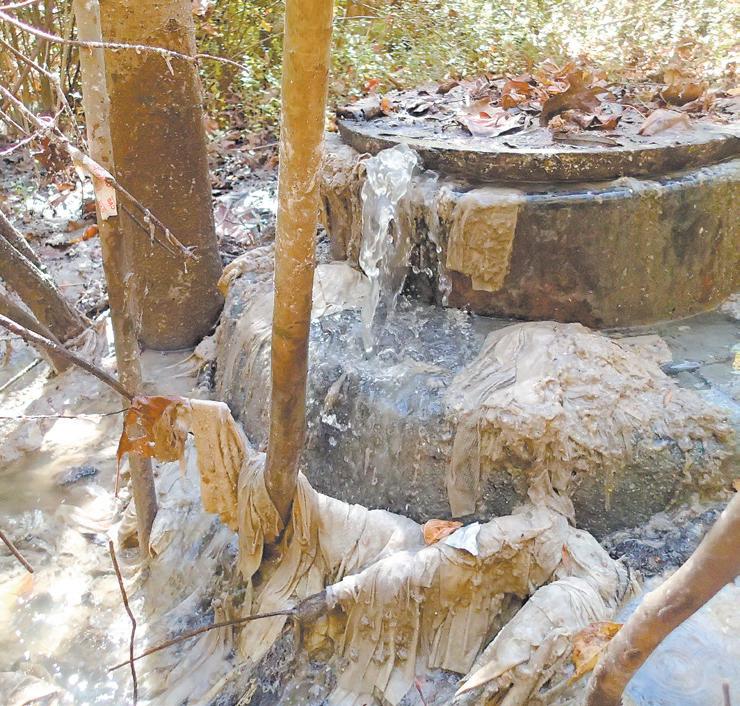
2 minute read
WATER ADVOCATE
Meet Chattahoochee Riverkeeper Jason Ulseth
By Clare S. Richie
Jason Ulseth’s lifelong passion, studies and experience are why he was tapped as the Chattahoochee Riverkeeper (CRK) lead advocate, spokesman and river patrol captain in 2015 and why he’s thriving in the role.
“My first memory is catching my first fish. Ever since then I’ve been hooked on fishing,” Ulseth shared. He spent his youth fishing in creeks, the Chattahoochee River or Lake Lanier.
He studied Environmental Health at the University of Georgia and started his career in state government. While at the Georgia Environmental Protection Division (EPD) and Georgia Soil and Water Conservation, Ulseth observed how underfunded and understaffed agencies struggled to protect water resources.
Through the lens of a state employee, Ulseth admired the CRK’s effective approach of advocacy, education, research, communication, cooperation, monitoring and legal actions for the Chattahoochee and its watershed.
So, he jumped at the chance to serve as CRK’s Technical Programs Director in 2007 and took over as Riverkeeper in 2015, charged with carrying on the legacy of one of strongest environmental organizations in the state.
His first year as Riverkeeper “was incredible with huge milestones.”
Ulseth is most proud of the asphalt manufacturer American Sealcoat case.
It is “one of the largest environmental penalties against a horrible industrial river polluter for one of the worst violations I’ve ever seen,” Ulseth noted. The $10 million judgment sends a message that “industrial polluters will not be tolerated.”
What’s more, M&K, the property owner who leased to American Sealcoat, agreed to cooperate with CRK and spent more than $500,000 to reverse the damage and prevent future contaminants. This is how CRK prefers to reach resolution, through communication and negotiated agreements, while reinforcing that water quality law compliance is not optional.
Ulseth shared his thoughts on the main water issues in Atlanta. “Right now we are in a period of large amounts of rain that has resulted in increased storm water run off, localized flooding, high rates of erosion, high bacteria levels and threats to water quality. Atlanta must prepare for extremes, both rain and drought.”
During one week in February, CRK stopped three sewer spills. One sewer line at Riverside and Azalea drives spilled 12 million gallons of raw sewage into the river because the sewer line was overwhelmed by storm water. Ulseth is working with Fulton County on how to prevent sewer overflows. CRK also fields hundreds of calls about construction site storm water runoff.
Fortunately, the Municipal Option Sales Tax (MOST) was extended, since it has already led to significant improvements in the Chattahoochee River and tributaries. “But more work lies ahead and infrastructure improvements need to be maintained,” Ulseth said. MOST revenue can be used for storm water improvements including addressing localized flooding.

Another long-term challenge is the lack of water quality compliance education and enforcement. EPD has only two staff people to monitor and educate thousands of potential industrial polluters across the state. CRK not only advocates for more resources at the state level, but also has engaged in a fundraising capacity campaign to beef up its own. The nonprofit is adding resources, both staff and technology, for water quality testing and compliance across the watershed.
Ulseth is also excited about “Get Out with CRK in 2016,” which includes spring dates for paddling, outings, cleanups and festivals, in order to put Atlantans back in touch with their river. Find details at chattahoochee.org and their mobile app.
For 2016 also look for CRK’s continued vigilance, with Ulseth leading the charge.
“Now more than ever, we need a Riverkeeper organization to keep tabs on this precious river so we have enough clean water for now and future generations,” Ulseth said.










